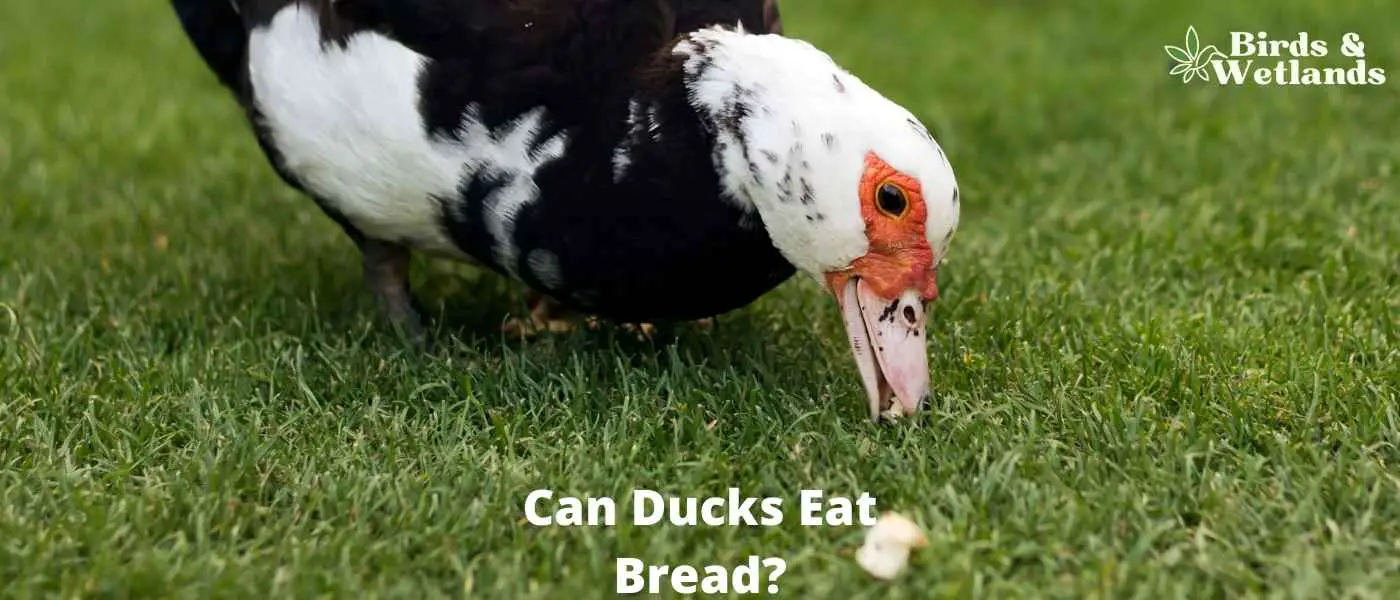Feeding bread to ducks is a common pastime, but is it actually good for them?
In this article, we’ll take a closer look at whether ducks can safely eat bread and what you need to know before offering them this popular snack.
Feeding ducks bread is discouraged, as it lacks essential nutrients and can lead to health issues. Bread can cause digestive problems, contribute to malnutrition, and lead to a condition called ‘angel wing’. Additionally, uneaten bread can cause water pollution, which negatively impacts aquatic ecosystems. Instead, offer ducks healthier options such as chopped leafy greens, peas, corn, oats, and seeds.
Key Takeaways
- Bread has little nutritional value and does not contain the nutrients that ducks and other bird populations need to stay healthy. Too much bread can be harmful to them.
- Ducks and geese can eat some types of bread, but they shouldn’t have too much because it can make them sick.
- If you feed bread to these birds, always remember to dispose of any uneaten bread properly so that it does not attract pests.
Affiliate Disclaimer: As an Affiliate, we earn from qualifying purchases.
Why Is Feeding Ducks Bread Bad for Them?
Stale bread is bad for ducks and other waterfowl because it is full of carbohydrates and bad nutrients. Ducks that feed on leftover bread can become obese and develop health problems.
Uneaten soggy bread can also attract predators to areas where ducks and geese are feeding, putting them at risk of being attacked or killed.
Additionally, young birds need to learn how to forage their own food. Having readily available food prevents them from learning this vital survival skill.
If you want to feed them, give them healthy foods like vegetables, defrosted frozen peas, fruits, or pellets designed specifically for them.
Best Duck Feed Pellets
Are you a duck owner looking for the perfect feed to keep your feathered friends happy and healthy? Look no further than Purina Duck Feed Pellets! With their nutritionally balanced formula and high-quality ingredients, these pellets are the ultimate solution for providing your ducks with the nutrition they need to thrive.
Pros
- Complete Nutrition: Purina Duck Feed Pellets are nutritionally balanced to provide all the essential vitamins and minerals that ducks need to stay healthy and strong.
- Easy to Digest: The pellets are specially formulated to be easy to digest, which makes them ideal for ducks of all ages.
- Promotes Growth and Development: With its balanced nutrition formula, Purina Duck Feed Pellets are designed to support healthy growth and development in ducks.
- Suitable for All Breeds: Whether you have domestic ducks or wild ducks, Purina Duck Feed Pellets are suitable for all breeds of ducks.
- Trusted Quality: Purina has been producing high-quality animal feed for over 100 years, so you can trust that your ducks are getting the best possible nutrition with Purina Duck Feed Pellets.
Cons
- Cost: Compared to other types of duck feed on the market, Purina Duck Feed Pellets can be slightly more expensive. However, many customers feel that the high-quality ingredients and balanced nutrition formula are worth the extra investment.
- Pellet Size: Some customers have noted that the pellet size of Purina Duck Feed Pellets can be quite large, which may not be suitable for smaller or younger ducks. However, many customers have reported that the pellets can easily be broken up or soaked in water to make them easier to eat.
How Does Feeding Ducks Bread Affect Their Habitat?
Perhaps, you have been tempted to feed wild ducks at your local park bread. Think again. Moldy bread along with bread crumbs not only affects the health of ducks, but also their habitat.
Bread is one of the worst things you can feed ducks. It can cause build-up of bad nutrients. Leftover bread can reduce water quality, clog waterways, and encourage harmful algae growth. Additionally, duck overcrowding creates excessive amounts of bird droppings which is the main cause of smelly and slippery underfoot.
What Can You Feed Ducks Instead of Bread?
One popular food that you can feed ducks is lettuce. They also like to feed on watermelon, grapes, and blueberries. You can also give them oats, cracked corn, barley, or birdseed. If you have leftover cooked rice, pasta, or vegetables, ducks enjoy those as well.
Generally, it is best to avoid feeding ducks sugary foods, meats, and other junk food made for humans. Processed foods should not be fed to these birds as well. If you want to give the ducks a treat, it is best to provide them with healthy food.
It is also important to remember that ducks should always have access to clean water. Humans should not throw their rotting food into the pond or lake.
Algae blooms and will contaminate the water which is bad for ducks.
Can Bread Cause Angel Wing in Ducks?
An Angel wing in ducks is a condition where the last joint on the duck’s wing is deformed and causes the end feathers to stick out laterally instead of lying flat against the body. This condition prevents flight.
There are many potential causes of angel wings in ducks, but one of the most common is poor nutrition such as feeding bread to ducks. A diet lacking specific vitamins and minerals but high in protein and carbohydrates can cause the bones and joints to develop improperly.
Another common cause of angel wings is genetics. Some breeds of ducks are simply more prone to this condition than others.
Other Foods Similar to Bread for Ducks
| Food | Anchor Link |
|---|---|
| Crackers | Are Crackers Safe for Ducks? |
| Chips | Ducks and Chips: A Good Mix? |
| Popcorn | Can Ducks Enjoy Popcorn? |
| Rice | Is Rice a Healthy Option for Ducks? |
| Oats | The Truth About Ducks and Oats |
| Moldy Bread | The Dangers of Moldy Bread for Ducks |


